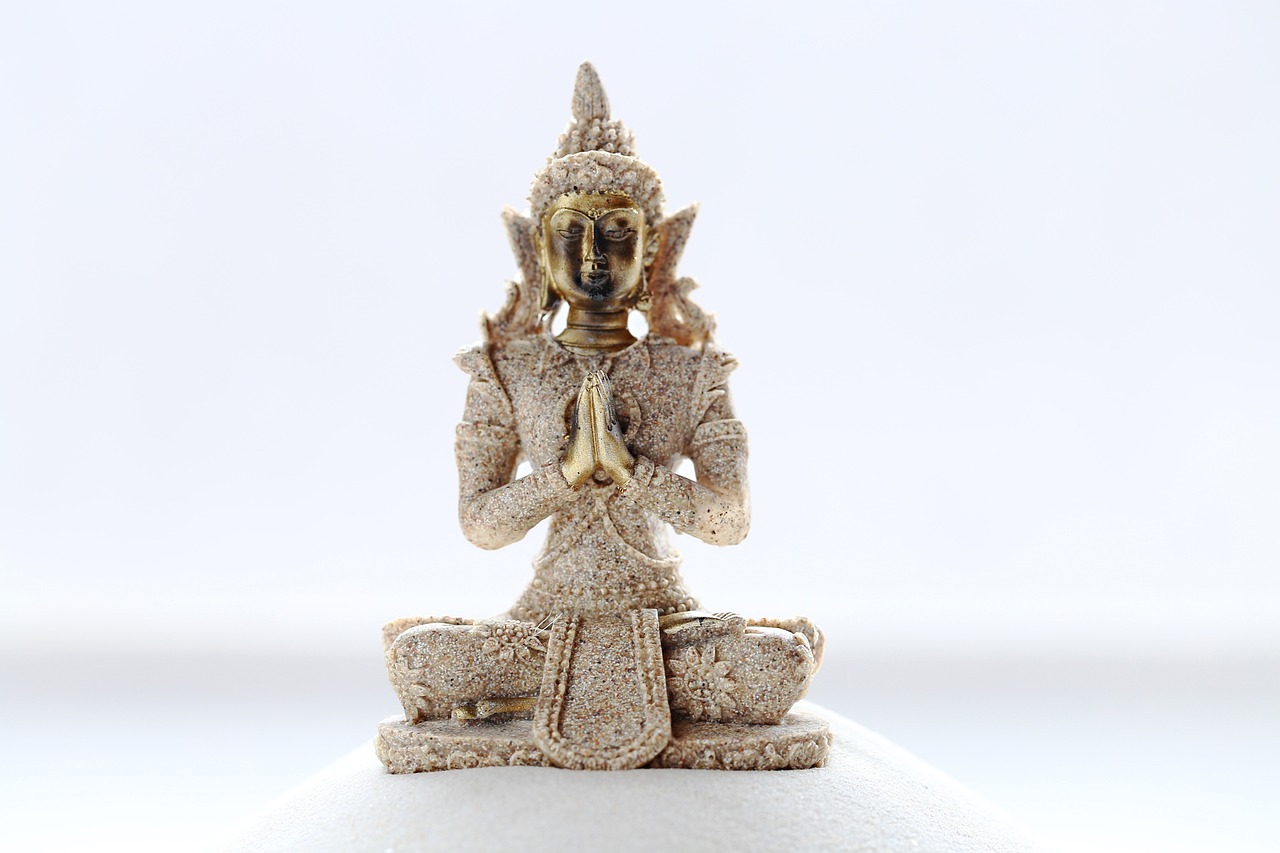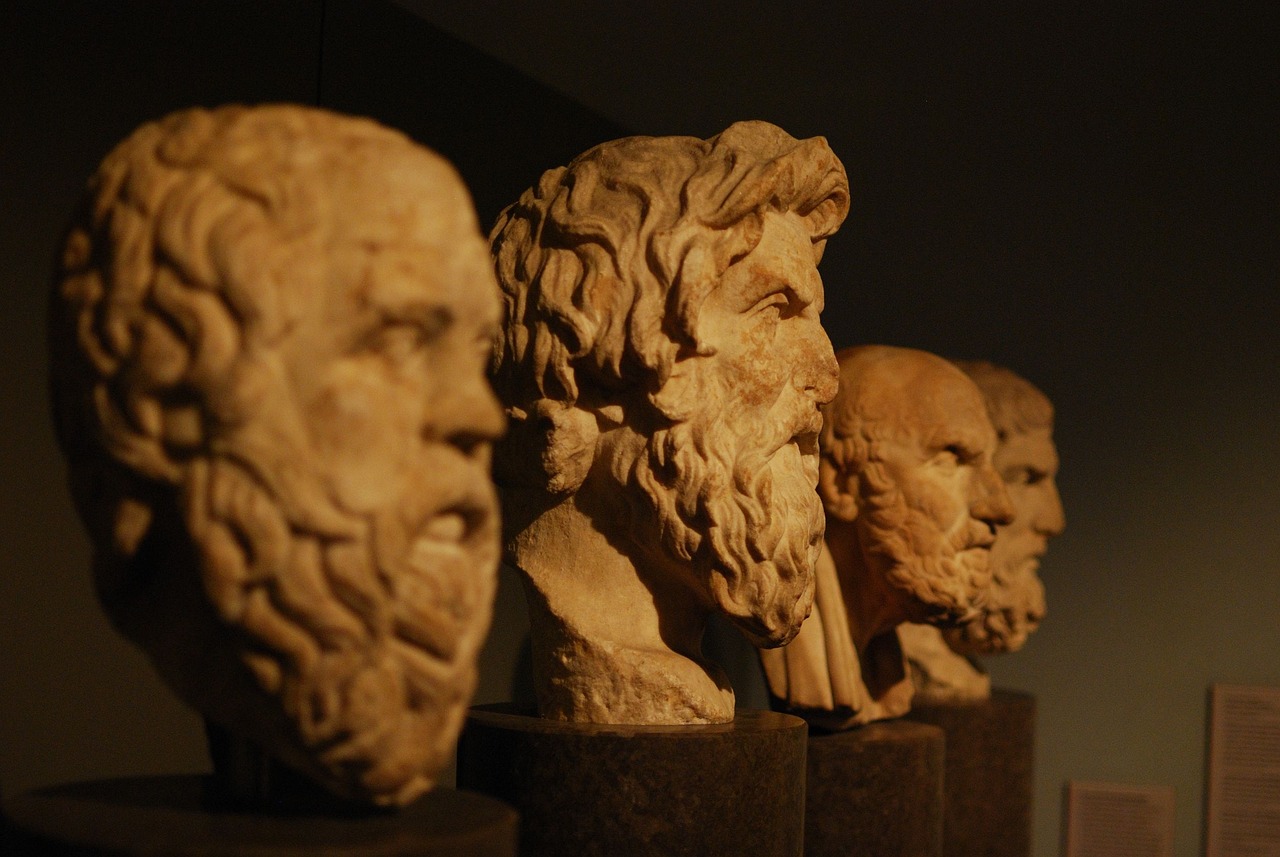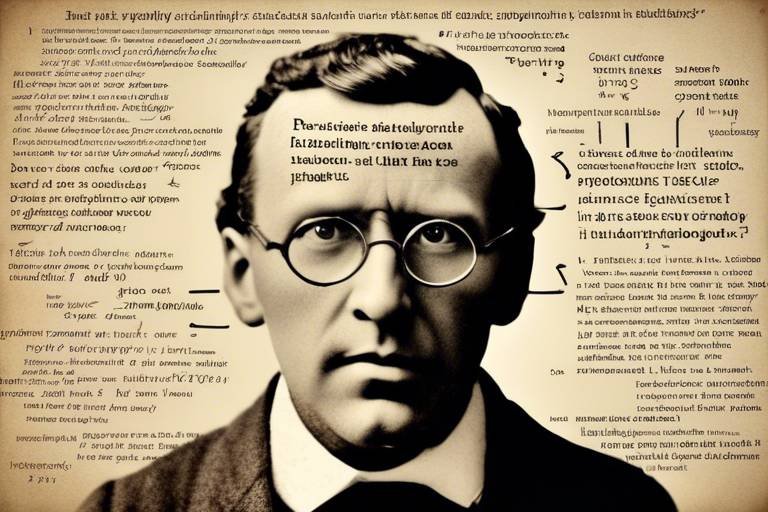Philosophy as a Way of Life - An Examination
In a world bustling with distractions and noise, the idea of integrating philosophy into daily life might seem like an abstract notion reserved for the intellectual elite. However, the truth is, philosophy is not just a subject studied in dusty old books; it’s a vibrant, living practice that can profoundly shape our existence. By examining the principles of various philosophical schools, we can uncover practical applications that enhance our everyday experiences. Imagine living with a sense of purpose, clarity, and resilience—this is the promise of a philosophical approach to life.
Throughout history, great thinkers have grappled with fundamental questions about existence, morality, and the human condition. Their insights can serve as guiding lights in our modern lives. From the stoics who taught us to find strength in adversity to existentialists who urge us to live authentically, philosophy offers a treasure trove of wisdom. The integration of these teachings into our daily routines can lead to a more fulfilling and meaningful life, allowing us to navigate the complexities of modern existence with grace and confidence.
As we embark on this exploration of philosophy as a way of life, we will delve into its historical roots, examining how ancient ideas continue to resonate today. We will also explore the transformative potential of philosophical practices in fostering personal growth, enhancing relationships, and guiding ethical decision-making. By doing so, we aim to demonstrate that philosophy is not merely an academic discipline but a practical toolkit for navigating the challenges and joys of life.
So, are you ready to unlock the secrets of living a more intentional life? Let’s dive into the rich tapestry of philosophical thought and discover how these timeless ideas can illuminate our path forward.
Understanding the origins of philosophy provides insight into its evolution and relevance today. This section will delve into ancient philosophers and their foundational ideas that continue to influence modern thought.
Philosophy encourages self-reflection and personal development. In this section, we will explore how philosophical practices can lead to enhanced self-awareness and personal transformation.
Stoicism teaches the importance of resilience in the face of adversity. This subsection will discuss how Stoic principles can be applied to cultivate mental strength and emotional stability.
Mindfulness, rooted in both Stoicism and Eastern philosophies, promotes living in the present. This part will highlight techniques for incorporating mindfulness into daily routines for improved well-being.
Understanding and managing emotions is crucial for personal growth. This section will present philosophical strategies for regulating emotions and maintaining balance in life.
Existentialist philosophy emphasizes the importance of living authentically. This subsection will examine how embracing existentialist ideas can empower individuals to create meaningful lives.
Philosophical insights can enhance interpersonal relationships. This section will explore how adopting philosophical frameworks can lead to healthier, more fulfilling connections with others.
Ethical considerations are vital in guiding behavior towards others. This subsection will discuss how philosophical ethics can inform our interactions and decision-making processes.
Effective communication is essential in relationships. This part will explore philosophical approaches to improving understanding and empathy in interpersonal dynamics.
Q: How can philosophy help me in my daily life?
A: Philosophy provides tools for critical thinking, self-reflection, and ethical decision-making, which can enhance your personal and professional life.
Q: Is philosophy only for academics?
A: Not at all! Philosophy is for everyone and can be applied to everyday situations, helping individuals navigate life's challenges more effectively.
Q: What are some practical ways to incorporate philosophy into my life?
A: You can start by reading philosophical texts, practicing mindfulness, engaging in self-reflection, and discussing philosophical ideas with others.
Q: Can philosophy improve my relationships?
A: Yes! By understanding ethical principles and improving communication skills through philosophical insights, you can foster healthier and more meaningful connections.

The Historical Roots of Philosophy
Understanding the origins of philosophy is like peeling back the layers of an onion; each layer reveals deeper insights into human thought and existence. The journey of philosophy began in ancient civilizations, where thinkers sought to explain the world around them, moving beyond mythological explanations. From the bustling streets of Athens to the serene landscapes of China, early philosophers laid the groundwork for the complex ideas we engage with today.
In ancient Greece, figures such as Socrates, Plato, and Aristotle emerged as prominent voices, each contributing unique perspectives that shaped Western philosophy. Socrates, known for his dialectical method, encouraged a style of questioning that prompted individuals to examine their beliefs critically. His famous assertion, "The unexamined life is not worth living," serves as a rallying cry for personal introspection even today.
Plato, a student of Socrates, expanded on his teacher's ideas, introducing the concept of the Forms—idealized versions of objects and concepts that exist in a realm beyond our physical world. This notion has influenced countless areas, including metaphysics and epistemology, and it invites us to ponder the nature of reality itself. Aristotle, in contrast, focused on empirical observation and categorization, laying the foundations for the scientific method and influencing various fields such as biology, ethics, and politics.
Meanwhile, in the East, philosophers like Confucius and Laozi were shaping thought through their teachings. Confucius emphasized the importance of morality and ethics in personal and societal relationships, advocating for a harmonious society built on respect and responsibility. Laozi, on the other hand, introduced the principles of Taoism, which encourages living in accordance with the natural flow of the universe, a concept that resonates with modern mindfulness practices.
The interplay between these ancient philosophies is fascinating. For instance, while Greek philosophers often sought to define virtue and the good life through reason, Eastern philosophies tended to emphasize harmony and balance within oneself and the universe. This divergence highlights the rich tapestry of human thought and the various ways people have sought to make sense of their existence.
As we move into the Middle Ages, philosophy became intertwined with religion, particularly in the works of scholars like St. Augustine and St. Thomas Aquinas. They sought to reconcile faith with reason, arguing that philosophical inquiry could deepen one's understanding of the divine. This period also saw the preservation and translation of ancient texts, ensuring that the wisdom of earlier thinkers would not be lost to time.
In the modern era, the Enlightenment sparked a revolution in philosophical thought. Thinkers like Descartes, Locke, and Kant challenged established norms, emphasizing reason, individualism, and the pursuit of knowledge. Descartes' famous declaration, "Cogito, ergo sum" (I think, therefore I am), encapsulates the shift towards a focus on the self as the starting point for knowledge.
Today, the roots of philosophy continue to influence our daily lives, offering frameworks for understanding complex issues and fostering critical thinking. The historical journey of philosophy reminds us that these ancient ideas are not merely relics of the past; they are living traditions that continue to shape our understanding of ourselves and the world around us. By engaging with these philosophical roots, we can cultivate a deeper appreciation for the ideas that inform our lives, ultimately enriching our personal and collective experiences.
- What is the significance of ancient philosophy? Ancient philosophy provides foundational ideas that influence modern thought, ethics, and science.
- How can philosophy be applied today? Philosophy encourages critical thinking, self-reflection, and ethical decision-making in everyday life.
- Who are some key figures in the history of philosophy? Notable philosophers include Socrates, Plato, Aristotle, Confucius, and Kant, among others.
- How does Eastern philosophy differ from Western philosophy? Eastern philosophy often emphasizes harmony and balance, while Western philosophy tends to focus on reason and individualism.

Philosophy and Personal Growth
Philosophy isn't just a collection of abstract ideas and theories; it's a powerful tool that can transform our lives and foster significant personal growth. When we dive into philosophical concepts, we embark on a journey of self-discovery that challenges our perceptions, beliefs, and habits. Imagine philosophy as a mirror reflecting our innermost thoughts and feelings, urging us to confront uncomfortable truths and embrace change. This process of self-reflection can lead to enhanced self-awareness, allowing us to understand ourselves better and make informed choices that align with our values.
At its core, philosophy encourages us to ask profound questions about our existence, purpose, and the nature of happiness. It's like standing at a crossroads, where each path represents a different way of thinking and living. By exploring various philosophical schools, we can uncover insights that resonate with us personally. For instance, the teachings of Stoicism can offer practical strategies for navigating life's challenges, while Existentialism can inspire us to live authentically and embrace our freedom. The beauty of philosophy lies in its versatility; it can be tailored to fit our individual journeys and needs.
Furthermore, engaging with philosophical practices can lead to profound personal transformation. When we actively apply philosophical concepts to our daily lives, we cultivate a mindset geared towards growth and resilience. This is particularly evident in the way we approach setbacks and failures. Instead of viewing them as insurmountable obstacles, philosophy teaches us to see them as opportunities for learning and growth. This shift in perspective is crucial for developing a resilient mindset, enabling us to bounce back stronger from adversity.
Stoicism, an ancient Greek philosophy, emphasizes the importance of resilience in the face of life's inevitable challenges. It teaches us that while we cannot control external events, we can control our reactions to them. This principle is like a life raft in turbulent seas, providing stability and strength when we feel overwhelmed. By practicing Stoic techniques, such as negative visualization and focusing on what we can control, we can cultivate mental fortitude and emotional stability.
Mindfulness, a concept rooted in both Stoicism and Eastern philosophies, encourages us to live in the present moment. It’s akin to hitting the pause button in a fast-paced world, allowing us to appreciate the now rather than getting lost in regrets of the past or anxieties about the future. Incorporating mindfulness into our daily routines can be as simple as taking a few moments to breathe deeply, engage in meditation, or simply observe our surroundings. These practices can enhance our overall well-being, helping us to remain grounded and centered amidst life's chaos.
Understanding and managing our emotions is crucial for personal growth. Philosophy offers various strategies for regulating emotions, allowing us to maintain balance in our lives. For example, Stoic techniques encourage us to examine our emotional responses critically. By identifying the thoughts that trigger our feelings, we can challenge irrational beliefs and replace them with more constructive ones. This process not only helps us manage our emotions but also fosters a deeper understanding of ourselves.
In summary, philosophy serves as a powerful catalyst for personal growth. By engaging with philosophical ideas and practices, we can enhance our self-awareness, cultivate resilience, and develop the emotional intelligence necessary for navigating life's complexities. It's an ongoing journey, one that invites us to explore, reflect, and ultimately transform into the best versions of ourselves.
- How can philosophy help with personal growth?
Philosophy encourages self-reflection and critical thinking, allowing individuals to understand themselves better and make informed choices that align with their values. - What is Stoicism?
Stoicism is an ancient philosophy that teaches the importance of resilience and emotional control, focusing on what we can control rather than external circumstances. - Can mindfulness be incorporated into daily life?
Yes, mindfulness can be practiced through techniques such as meditation, deep breathing, and conscious observation of our surroundings, enhancing overall well-being. - What role does emotional regulation play in personal development?
Emotional regulation helps individuals manage their feelings effectively, leading to better decision-making and healthier relationships.

Stoicism and Resilience
Stoicism, a philosophy that originated in ancient Greece, offers profound insights into the art of resilience. At its core, Stoicism teaches us that while we cannot control external events, we can control our responses to them. This fundamental principle is a game-changer in how we navigate life's challenges. Imagine facing a storm; while you can't stop the rain, you can choose whether to dance in it or seek shelter. This choice is where the power of Stoicism lies.
One of the most compelling aspects of Stoicism is its emphasis on the concept of virtue as the highest good. Stoics believed that living a virtuous life—characterized by wisdom, courage, justice, and temperance—leads to true happiness. In times of adversity, recalling these virtues can serve as a guiding light, helping us to respond thoughtfully rather than react impulsively. For instance, when confronted with a setback at work, a Stoic might reflect on their values, choose to act with integrity, and focus on what can be learned from the experience, rather than wallowing in frustration.
To further illustrate the practical applications of Stoicism in cultivating resilience, consider the following Stoic practices:
- Negative Visualization: This technique involves imagining the worst-case scenario to appreciate what you currently have. By contemplating loss, you can foster gratitude and prepare emotionally for potential challenges.
- Dichotomy of Control: Understanding what is within your control and what is not can alleviate anxiety. Focus your energy on your actions and responses, rather than worrying about outcomes beyond your influence.
- Reflective Journaling: Writing down your thoughts and feelings can help clarify your emotions and reinforce your Stoic practices. It’s a way to check in with yourself and assess your reactions to daily events.
These practices can transform how we perceive and respond to challenges. When life throws a curveball—be it a personal loss, a professional setback, or a global crisis—Stoicism equips us with the mental tools to endure and even thrive. It's about building a mental fortress that stands strong against the winds of misfortune.
Moreover, Stoicism encourages the cultivation of emotional resilience. By recognizing that our emotions are often the result of our interpretations of events rather than the events themselves, we can learn to manage our feelings more effectively. This perspective allows us to approach difficulties with a calm mind and a steady heart. For example, when faced with criticism, instead of reacting defensively, a Stoic would analyze the feedback objectively, extracting valuable lessons while maintaining their composure.
In summary, Stoicism provides a robust framework for building resilience. By embracing its teachings, we learn to navigate life's tumultuous waters with grace and strength. It's not just about enduring hardships; it's about thriving despite them. As we integrate Stoic principles into our daily lives, we cultivate a mindset that is prepared for whatever challenges may come our way, allowing us to emerge stronger and more resilient than ever.

Practicing Mindfulness
Mindfulness is more than just a buzzword; it's a transformative practice that has roots in both Stoicism and Eastern philosophies. At its core, mindfulness is about being fully present in the moment, aware of your thoughts, feelings, and surroundings without judgment. Imagine sitting in a quiet room, the world outside bustling with activity, yet you are at peace, anchored in the here and now. This state of awareness can significantly enhance your overall well-being and mental clarity.
To integrate mindfulness into your daily routine, consider these practical techniques:
- Breath Awareness: Start with focusing on your breath. Take a few minutes each day to sit quietly and observe your breathing. Notice the rise and fall of your chest, the way the air feels as it enters and exits your nostrils. This simple act can ground you and bring your mind back to the present.
- Mindful Eating: Transform your meals into a mindfulness practice. Instead of rushing through lunch, take the time to savor each bite. Notice the flavors, textures, and aromas. This not only enhances your appreciation for food but also helps in digestion and portion control.
- Nature Walks: Spend time outdoors and engage your senses. Listen to the rustle of leaves, feel the breeze on your skin, and observe the colors around you. Nature has a unique ability to bring us back to the present moment.
Incorporating mindfulness into your life doesn’t have to be overwhelming. Start small, perhaps with just a few minutes of focused breathing each day, and gradually build up to more extensive practices. The key is consistency. Just like a muscle, your mindfulness skills will strengthen over time with regular practice.
Moreover, mindfulness can serve as a powerful tool in managing stress and anxiety. By training your mind to focus on the present, you can reduce the tendency to dwell on past regrets or future worries. This shift in perspective fosters a sense of calm and resilience, allowing you to navigate life's challenges with greater ease.
In a world filled with distractions, practicing mindfulness can feel like finding a hidden oasis. It encourages us to slow down, to appreciate the small moments, and to reconnect with ourselves. As you embark on this journey, remember that mindfulness is not about achieving a particular state of mind but rather about embracing the journey itself. So why not take a moment right now to pause and breathe? You might just find that the present moment holds everything you need.
- What is mindfulness? Mindfulness is the practice of being fully present and engaged in the current moment, aware of your thoughts and feelings without judgment.
- How can I start practicing mindfulness? Begin with simple techniques like breath awareness, mindful eating, or taking nature walks to cultivate mindfulness in your daily life.
- Can mindfulness help with stress? Yes, practicing mindfulness can significantly reduce stress and anxiety by helping you focus on the present moment instead of worrying about the past or future.
- How long should I practice mindfulness each day? Start with just a few minutes a day and gradually increase the duration as you become more comfortable with the practice.

Emotional Regulation Techniques
When it comes to navigating the choppy waters of our emotions, having a set of effective can be a game changer. Think of your emotions as a wild horse; if you don’t learn to ride it, it might take you on a chaotic journey. So, how do we rein in those feelings and steer them in a positive direction? The answer lies in a blend of philosophical insights and practical strategies that can help us maintain our emotional balance.
One of the most powerful techniques is cognitive reframing. This involves changing the way we perceive a situation. For instance, instead of viewing a setback as a failure, we can see it as an opportunity for growth. This shift in perspective can significantly alter our emotional response. Imagine you're stuck in traffic on your way to an important meeting. Instead of letting frustration take over, you could view it as a chance to listen to a podcast or reflect on your goals—turning a stressful situation into a productive one.
Another effective strategy is mindfulness meditation. This practice, which has roots in both Stoicism and Eastern philosophies, encourages us to stay present and observe our thoughts and feelings without judgment. By dedicating just a few minutes each day to mindfulness, we can cultivate a deeper awareness of our emotional states. This awareness allows us to recognize when we’re about to spiral into negative emotions, giving us the opportunity to pause and choose a more constructive response.
In addition to mindfulness, journaling can also serve as a powerful tool for emotional regulation. Writing down your thoughts and feelings can provide clarity and help you process your experiences. It’s like having a heart-to-heart conversation with yourself, where you can express your frustrations, joys, and everything in between. By putting pen to paper, you can externalize your emotions and gain a better understanding of what triggers them.
Moreover, practicing self-compassion is crucial in emotional regulation. Often, we are our own worst critics, beating ourselves up over perceived shortcomings. By treating ourselves with kindness and understanding, we can create a more supportive inner dialogue. For example, if you make a mistake at work, instead of berating yourself, remind yourself that everyone makes mistakes and that it’s a part of the learning process. This shift can help you bounce back more quickly and maintain emotional equilibrium.
Lastly, it’s important to recognize the role of social support in emotional regulation. Surrounding ourselves with understanding and empathetic individuals can provide a buffer against negative emotions. Having someone to talk to, whether it’s a friend, family member, or therapist, can help us process our feelings and gain new perspectives. Just as a sturdy bridge can support heavy traffic, a strong social network can help us navigate our emotional landscape.
In summary, incorporating these emotional regulation techniques into our daily lives can lead to enhanced emotional stability and overall well-being. By practicing cognitive reframing, mindfulness, journaling, self-compassion, and leaning on social support, we can transform our emotional experiences from chaotic storms into manageable breezes. So, why not give these techniques a try? You might just find that you have more control over your emotions than you ever thought possible!
- What is emotional regulation? Emotional regulation refers to the ability to manage and respond to your emotional experiences in a healthy way.
- Why is emotional regulation important? It helps in maintaining mental health, improving relationships, and enhancing overall well-being.
- Can anyone learn emotional regulation techniques? Absolutely! With practice and dedication, anyone can learn to regulate their emotions effectively.
- How long does it take to see results from these techniques? Results can vary, but many people start to notice positive changes within a few weeks of consistent practice.

Existentialism and Authenticity
Existentialism is a philosophical movement that digs deep into the essence of human existence, emphasizing the importance of individual freedom, choice, and authenticity. Imagine standing at a crossroads in life, where every path represents a different choice, each leading to a distinct future. This is where existentialism shines, urging us to take responsibility for our choices and encouraging us to live authentically. But what does it mean to live authentically? In a world teeming with societal expectations and norms, the quest for authenticity can often feel like swimming against the current. Yet, it is this very struggle that can lead to profound personal growth.
At the heart of existentialism lies the idea that we are not defined by external labels or societal roles but rather by the choices we make. This philosophy challenges us to peel back the layers of our identities and confront the uncomfortable truths about ourselves. Think of it as peeling an onion—each layer removed reveals a new facet of your true self, often accompanied by tears of realization. By embracing our authentic selves, we can create lives filled with purpose and meaning.
One of the key figures in existentialist thought, Jean-Paul Sartre, famously stated, "Existence precedes essence." This means that we are born without a predefined purpose; it is up to us to create our own essence through our actions and choices. This perspective empowers us to take charge of our lives and encourages us to break free from the chains of conformity. However, it also comes with the weight of responsibility. When we acknowledge that our choices shape our identities, we must also grapple with the consequences of those choices.
Living authentically often requires us to confront our fears and insecurities. It’s like standing on the edge of a diving board, heart racing, contemplating the leap into the deep end. The water might be cold, and the plunge daunting, but the exhilaration of diving into the unknown is what makes it worthwhile. By embracing our fears, we can tap into our true potential and live lives that resonate with our core values.
Furthermore, existentialism encourages us to cultivate meaningful connections with others. Authentic relationships are built on honesty and vulnerability, allowing us to share our true selves without pretense. When we engage with others authentically, we foster deeper connections that enrich our lives. Think about it: how many times have you felt a genuine bond with someone after sharing your fears or dreams? These moments of authenticity create a sense of belonging that is essential for our well-being.
In essence, existentialism serves as a powerful reminder that life is a canvas, and we are the artists. We hold the brush, and it’s up to us to paint our own masterpiece. By embracing our freedom to choose and committing to living authentically, we can navigate the complexities of life with confidence and purpose. As we embark on this journey, we must remember that authenticity is not a destination but a continuous process of self-discovery and growth.
- What is existentialism? Existentialism is a philosophical movement focusing on individual freedom, choice, and the search for meaning in life.
- How can I live authentically? To live authentically, embrace your true self, make choices that resonate with your values, and engage in honest relationships.
- Why is authenticity important? Authenticity fosters deeper connections, enhances personal growth, and leads to a more fulfilling life.
- Who are key figures in existentialism? Notable existentialists include Jean-Paul Sartre, Simone de Beauvoir, and Friedrich Nietzsche.

Philosophy in Relationships
When we think about relationships, whether they are romantic, familial, or friendships, the depth of our connections often hinges on the underlying principles that guide our interactions. Philosophy, at its core, offers a treasure trove of insights that can illuminate the complexities of human relationships. By applying philosophical concepts, we can navigate the intricacies of our connections with clarity and purpose. Have you ever wondered how the way you think about ethics and morality influences your relationships? The answers might surprise you.
One of the most significant contributions of philosophy to relationships is its emphasis on ethical considerations. Ethics, the study of what is right and wrong, can serve as a compass guiding our behavior towards others. When we engage in relationships, we often face dilemmas that require us to weigh our actions against our moral beliefs. For instance, consider a situation where a friend confides in you about a personal issue. The ethical approach would involve respecting their privacy while also providing support. This delicate balance is where philosophical ethics come into play, helping us make decisions that honor both our values and our relationships.
Moreover, philosophical frameworks encourage us to reflect on our intentions and the impact of our actions. By asking ourselves questions like, “What does it mean to be a good friend?” or “How can I be more supportive in my relationships?” we can cultivate a deeper understanding of our roles in the lives of others. This self-reflection is not just an abstract exercise; it has real-world implications. For example, Aristotle’s concept of virtue ethics emphasizes the importance of character and virtues in our interactions. By striving to embody virtues such as honesty, kindness, and empathy, we can enhance the quality of our relationships.
Effective communication also plays a pivotal role in the success of any relationship. Philosophy offers various approaches to improving understanding and empathy among individuals. Engaging in philosophical dialogues can help us articulate our thoughts and feelings more clearly, fostering a space for open and honest communication. Imagine sitting down with a partner or a friend and discussing your viewpoints on a topic that matters to both of you. This exchange not only deepens your connection but also allows you to appreciate differing perspectives, thus enriching your relationship.
To further illustrate the impact of philosophy on relationships, consider the following table that outlines key philosophical concepts and their relevance to interpersonal dynamics:
| Philosophical Concept | Application in Relationships |
|---|---|
| Ethics | Guides moral behavior and decision-making in interactions. |
| Virtue Ethics | Promotes character development and virtues in relationships. |
| Existentialism | Encourages authenticity and personal responsibility in connections. |
| Communication Philosophy | Enhances understanding and empathy through dialogue. |
Ultimately, philosophy serves as a powerful tool for enhancing our relationships. By embracing its principles, we can navigate the complexities of human interaction with greater awareness and intention. Imagine how much richer your relationships could be if you approached them with the same curiosity and critical thinking that philosophers have employed for centuries. The journey of integrating philosophy into our daily interactions may not always be easy, but the rewards—deeper connections, improved understanding, and a more fulfilling life—are undoubtedly worth it.
- How can philosophy improve my relationships? Philosophy encourages self-reflection, ethical behavior, and effective communication, all of which can enhance your connections with others.
- What philosophical concepts should I focus on? Key concepts include ethics, virtue ethics, existentialism, and communication philosophy, each offering valuable insights into interpersonal dynamics.
- Can philosophy help with conflict resolution? Yes! Philosophical dialogue promotes understanding and empathy, which are essential for resolving conflicts amicably.

Ethics and Morality in Interactions
When we think about ethics and morality, we often envision lofty ideals—principles that guide our actions and decisions in a world that can sometimes feel chaotic. But what does this really mean for our day-to-day interactions? Well, ethics and morality are not just abstract concepts; they are the very fabric of our relationships and how we connect with others. They shape our choices, influence our behavior, and ultimately define the quality of our interactions.
At its core, ethics is about making choices that reflect our values. Whether we're in a personal relationship, a professional setting, or even a casual encounter, the ethical principles we hold dear influence how we treat others. For instance, consider the principle of respect. When we approach interactions with a mindset of respect, we acknowledge the inherent worth of others, which can lead to more meaningful connections. This respect can manifest in various ways, such as actively listening when someone speaks, valuing their opinions, or simply being courteous in our communications.
Moreover, morality often involves a deeper understanding of right and wrong. It’s not just about following societal rules; it’s about cultivating a personal moral compass that guides us through complex situations. In relationships, this might mean recognizing when to stand firm in our beliefs while also being open to the perspectives of others. It’s a delicate balance, but one that can enrich our interactions and foster mutual understanding.
To illustrate this, let’s explore a few ethical frameworks that can be applied to our interactions:
- Utilitarianism: This approach encourages us to consider the consequences of our actions. Are we making choices that maximize happiness for the greatest number of people? This perspective can help us navigate tricky social situations by focusing on the overall impact of our decisions.
- Deontological Ethics: This framework emphasizes duty and rules. It asks us to consider whether our actions align with our moral obligations. For example, being honest in our interactions, even when it might be easier to bend the truth, reflects a commitment to ethical principles.
- Virtue Ethics: Rather than focusing solely on rules or outcomes, this approach encourages us to cultivate positive character traits. By striving to be compassionate, empathetic, and fair, we naturally enhance the quality of our interactions.
These frameworks can guide us in making ethical decisions, but the real challenge lies in applying these principles consistently. It’s easy to talk about ethics in theory, but when emotions run high or when we’re faced with difficult choices, it can be tempting to stray from our moral beliefs. This is where self-awareness comes into play. By regularly reflecting on our actions and their alignment with our ethical values, we can navigate the complexities of human interaction more effectively.
Furthermore, ethical communication is crucial in fostering healthy relationships. When we communicate openly and honestly, we build trust, which is the bedrock of any meaningful connection. This means being transparent about our intentions and feelings, and also being willing to listen and understand the perspectives of others. In a world where misunderstandings can easily escalate into conflicts, practicing ethical communication can be a game-changer.
In conclusion, ethics and morality are not just theoretical concepts; they are active components of our daily interactions. By grounding our relationships in ethical principles, we can create a more harmonious and fulfilling social environment. Remember, the next time you find yourself in a challenging interaction, take a moment to reflect on your values and how they can guide your response. After all, every interaction is an opportunity to practice empathy, respect, and moral integrity.
- What is the difference between ethics and morality? Ethics often refers to the rules and guidelines that govern conduct within a particular context, while morality pertains to personal beliefs about right and wrong.
- How can I improve my ethical decision-making? Regular self-reflection and seeking feedback from others can help you align your actions with your ethical beliefs.
- Why is ethical communication important? It fosters trust, reduces misunderstandings, and enhances the quality of relationships.

Communication and Understanding
Effective communication is the lifeblood of any relationship. It’s the bridge that connects us to others, allowing us to share our thoughts, feelings, and ideas. However, have you ever felt that your message didn’t quite land? Or that your words were misinterpreted? This is where the philosophical approach to communication comes into play. By adopting a more thoughtful and reflective mindset, we can enhance our ability to connect with others on a deeper level.
At its core, communication is not just about exchanging information; it’s about understanding. This understanding is built on several key philosophical principles that can transform how we interact with those around us. Let’s explore some of these principles:
- Active Listening: This involves fully concentrating, understanding, responding, and then remembering what is being said. It’s about being present in the moment and showing genuine interest in the speaker’s words.
- Empathy: This is the ability to put yourself in someone else’s shoes. When we understand the emotions and perspectives of others, our responses become more compassionate and thoughtful.
- Clarity and Precision: Philosophical communication emphasizes the importance of clear and precise language. This helps to minimize misunderstandings and ensures that the message is conveyed accurately.
By integrating these principles into our daily conversations, we can foster a deeper level of understanding. For instance, when engaging in a discussion, try to practice active listening by summarizing what the other person has said before responding. This not only shows that you value their input but also helps clarify any potential miscommunications.
Moreover, adopting an empathetic approach can significantly enhance your relationships. Imagine having a disagreement with a friend; instead of reacting defensively, try to understand their viewpoint. This doesn’t mean you have to agree, but acknowledging their feelings can lead to a more constructive dialogue. In this way, communication becomes a collaborative process rather than a confrontational one.
In addition to these interpersonal strategies, it’s also beneficial to reflect on the philosophical underpinnings of your communication style. Are you approaching conversations with an open mind? Are you willing to challenge your own beliefs in light of new information? This self-reflection can lead to greater authenticity in your interactions, allowing for richer and more meaningful exchanges.
Ultimately, the goal of effective communication is to foster understanding and connection. By embracing philosophical principles, we can navigate the complexities of human interaction with greater ease and empathy. So, the next time you find yourself in a conversation, remember that it’s not just about what you say, but how you say it—and how well you listen.
Q: How can I improve my active listening skills?
A: Practice focusing entirely on the speaker, avoiding distractions, and summarizing their points to ensure you understand their message.
Q: What if I struggle to empathize with others?
A: Start by asking open-ended questions to learn more about their perspective. This can help you connect with their feelings and experiences.
Q: How do I ensure clarity in my communication?
A: Use simple, direct language and avoid jargon. Be specific about your thoughts and feelings to minimize misunderstandings.
Frequently Asked Questions
- What is the significance of philosophy in everyday life?
Philosophy isn't just a dusty subject found in textbooks; it's a vibrant way of thinking that can transform your daily existence. By applying philosophical principles, you can gain clarity, make better decisions, and live a more fulfilling life. It's like having a personal guide that helps you navigate the complexities of life with wisdom and insight.
- How can Stoicism help me deal with stress and adversity?
Stoicism teaches us that while we can't control external events, we can control our reactions to them. By embracing Stoic practices, you can build resilience and mental fortitude, allowing you to face challenges with a calm and collected mindset. Think of it as a mental gym where you train your mind to lift the weights of life’s difficulties.
- What techniques can I use to practice mindfulness?
Mindfulness can be practiced through various techniques such as meditation, deep breathing, and simply being present in the moment. Start with just a few minutes a day, focusing on your breath or observing your thoughts without judgment. It's like hitting the pause button on life, giving you space to reflect and recharge.
- How can philosophy enhance my relationships?
Philosophy offers valuable insights into ethics and communication, helping you navigate interpersonal dynamics more effectively. By understanding different philosophical perspectives, you can foster empathy and improve your interactions, leading to deeper connections. It's akin to having a roadmap for navigating the often winding paths of relationships.
- What role does existentialism play in finding personal meaning?
Existentialism encourages you to explore your own values and beliefs, empowering you to live authentically. By confronting life's inherent uncertainties and creating your own meaning, you can craft a life that truly reflects who you are. It's like being the author of your own story, with the freedom to choose your narrative.
- How can I regulate my emotions using philosophical strategies?
Philosophical strategies for emotional regulation include self-reflection, understanding the nature of emotions, and applying ethical reasoning to your feelings. By recognizing that emotions are temporary and often influenced by our thoughts, you can learn to manage them more effectively. Think of it as developing an emotional toolbox that helps you handle life's ups and downs with grace.



















